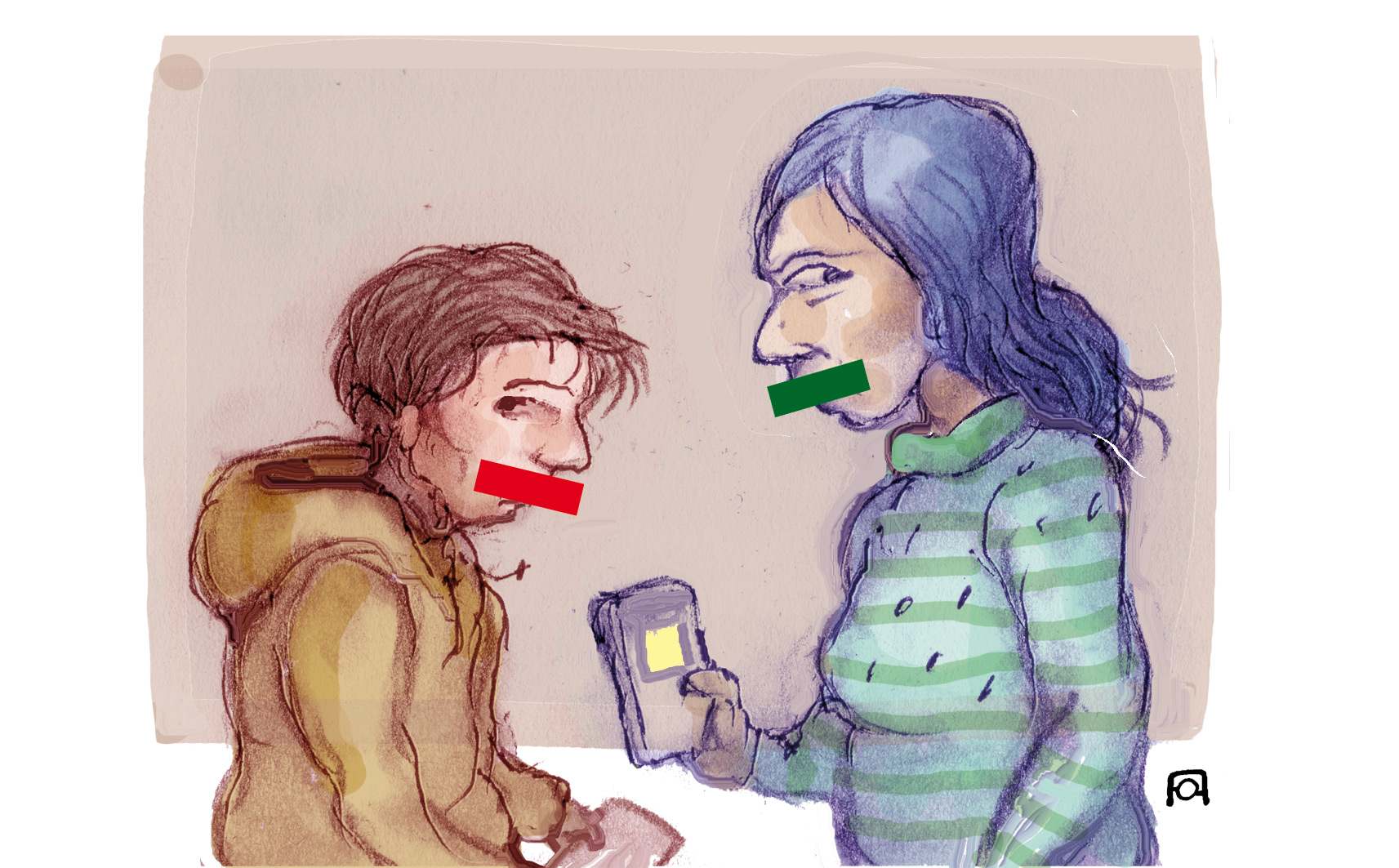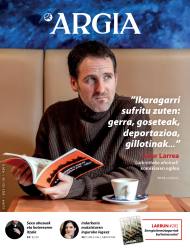An ideology for Basque for young people, please

I went back to school a couple of weeks ago, having been on leave for a while, and for a long time, to model D. I was very excited to meet the "Basque" teenagers, because I spent long years on model A and model B of Lapurdi, in French national education, and I was tired of the strangeness that the Basques felt in those cases. Working in the teaching of Euskera, but in such a parallel world, without being able to relate with students only in Euskera, or naturally living the Basque culture, or sharing references and worldview.
I thought it was going to be a kind of back to the sweet house, but look where I just saw that everything was a fantasy, a chimera. Yes, the truth is that I have felt very sad seeing the linguistic behavior of the students, they have an almost absolute tendency towards Spanish, but from there they have started to show a kind of pride towards their linguistic option, a greater shame, which we also do in Spanish, without expressing any kind of regret and effort before our warnings. Concerning.
Not only do I want to go against the students, but I must acknowledge that language is an issue that touches upon a very inner fiber, and that is why I have to make a special effort not to fall into reactivity, not to jeopardise the relationship. The simplest thing would be to put all responsibility in charge, but it would be a simple and naive analysis, because we are also responsible, and because we know that we are directly challenged by all those who make young people. Even if we don't like it, they are our mirror, symptom and direct consequence of who we are.
We should focus on the normalization of the people (independence) and focus on it, because it is the only remedy for the Basque Country
The challenging use of Spanish seems to me, or at least I want to think, that it is a form of reaction of the educational offer that still does not take into account the needs of young people. We are agents of this system, and as they are aware of the pain produced by Spanish, they find in it the way to express rage against it, an effective weapon. It is a symptom and I try not to give more importance than it has.
And this inertia of speaking in Spanish, or the difficulty of speaking in Euskera, is explained by our situation of dependence and oppression, the growing diglosia it generates. The dominated people also have an undervalued and subtitled language, and it is difficult for the Basque people to compete with the total hegemony of Castilian, at least in the eyes of a young man. What language would you reach, if you are young, in the Region of Pamplona (for example)?
We should focus on the normalization of the people (independence), and thus concentrate all our strength, which is the only remedy for the Basque country. The party of linguistic survival is played in the sphere of maximum policy and the solution does not, therefore, depend on education, or at least not only. But can something be done in our area? Sure enough. To index our students sociopolitically, adequately contextualizing the problem of the Basque Country, explaining the reasons for what happens to us. It's not much, but it's something.
To do something similar to the treatment that we have started to give in education to female oppression, for example, is not that difficult. Students are told that the problem must be understood within a system of major, heteropatriarchal oppression, and that the instrument – feminism – of an ideology that helps put it in the right framework. Why do we not act equally with the Basque Country? Why do we not recover the concepts of imperialism or national oppression?
I don't know, but the data is alarming. The time has come to leave the world of Yuppi.
Bidali zure iritzi artikuluak iritzia@argia.eus helbide elektronikora
ARGIAk ez du zertan bat etorri artikuluen edukiarekin. Idatzien gehienezko luzera 4.500 karakterekoa da (espazioak barne). Idazkera aldetik gutxieneko zuzentasun bat beharrezkoa da: batetik, ARGIAk ezin du hartu zuzenketa sakona egiteko lanik; bestetik, egitekotan edukia nahi gabe aldatzeko arriskua dago. ARGIAk azaleko zuzenketak edo moldaketak egingo dizkie artikuluei, behar izanez gero.
To be honest, I don't know why I'm writing this. In today’s hostile environment, opinions of this kind are not well received. Perhaps LUZ will not publish this because it does not correspond to the opinions they have published so far (but if they have finally decided to publish... [+]
On January 15, the techno-business lobby called Cedarios presented its 6th report, Euskadi and the European Union, the shared destiny of prosperity and competitiveness. This neoliberal Think Tank, made up of eminent experts drawn from the world of finance, presented a magical... [+]
We Basques move our feet behind the witness of Korrika to proclaim that we want to survive as a Basque people in favor of our language, with the aim of the Basque Country we desire.
The tipi-tapa is the first step taken by a migrant person who leaves his homeland in Africa,... [+]
And for another year, the unions have organized prefabricated strikes for us. And we, individually, will decide whether or not to join the strike, without the need for any assembly at the school.
The strike model that I was taught is no longer in vogue, it seems. In my... [+]
Life surrounds everything, it is limited and fragile. To live good lives, it seems to me that the body knows what to do, while the mind, although it knows (when it is well informed), often sees the body deliberately silence. In this silence the mind opens itself to relations... [+]
Eroso gaude ingurunea gure egoera fisiko/emozionalera egokitzen denean. Besteak ni kontuan hartu nauenean, izan gizaki bat, objektu bat, espazio bat. Erosotasunaren klabea produktu eta espazio diseinuan beharrizan handi gisa sartu da, erosotzat jotzen dena erosgarria delako... [+]
Nafarroa Arenan Mitoaroa ikusten izandako lagun batek “telurikotzat” jo zuen entzun-ikusi-sentitutakoa. Niri ere hala iruditu zitzaidan telebista medio etxetik hauteman nuena.
Pentsa daiteke Mitoaroak piztutako grinak eta atxikimenduak proiektuaren ikusgarritasuna... [+]
It is the habit of making decisions that will change our lives with the beginning of the new year. We make lists on three points: one, more sports practice; two, seeing old friends more often; three, going back to Iceland, real and metaphorically. As the months go by, we realize... [+]
Zirkulazioan lehentasunek garrantzi handia dute. Gidatzeko ikasten dugun lehen gauzatakoak dira: biribilguneak eta STOPak menperatu ezean nekez lortuko dugu gidabaimena.
Hala ere, lehentasunak ez dira kontu neutroak, eta historiak eta interes kontrajarriek aldatu izan... [+]
Since Benito Lertxundi, who told us that he will leave the scenes for ever, we have been there for several weeks, and since then many of us have felt orphans in one way or another, with a sense of loss or abandonment, sad. To Iruindarro, at least, we will remain forever honored... [+]
There are three knots that complicate our coexistence in the Basques, and for many years, despite our patience and determination, we are unable to break free from these ties. There are at least three knots of the moment: prisoners, Basque, immigrants.
With the new year we are... [+]
Today, January 21, is a day to remember and reflect on an interesting ephemeris of our recent history. It is 50 years since the lockdown of 47 workers from Potase in Navarre. This lockdown, which lasted fifteen days, caused a general strike in Navarre, the Department of the... [+]
A couple of weeks ago, a number of data from Norway was published. In this country of Northern Europe electric cars have predominated, being the Tesla brand the most sold, with 90% of recyclable energy consumed there. On the contrary, Norwegian public enterprises have no problem... [+]
These were my last words when we left, held hand in your deep breathing sleep. Your heart stayed forever without a special, simple, dignified pain. As you want and demand. How we want and respect.
Already a month before the arrival of winter, the last days of the longest night,... [+]



















.jpg)